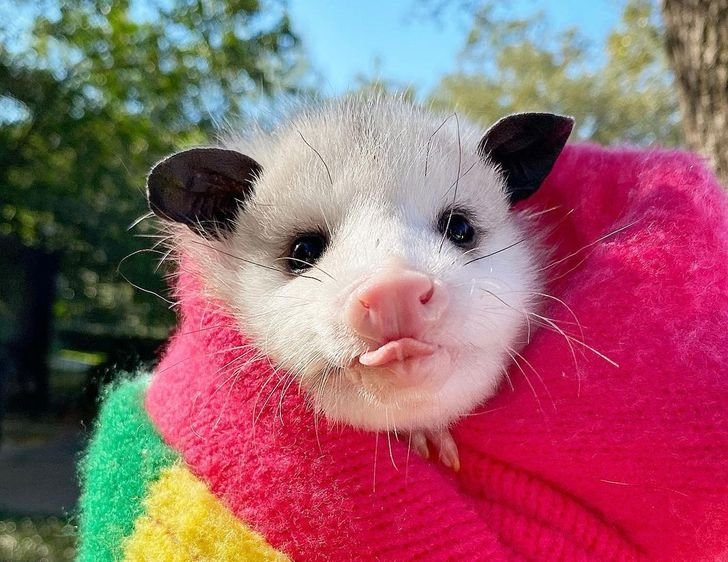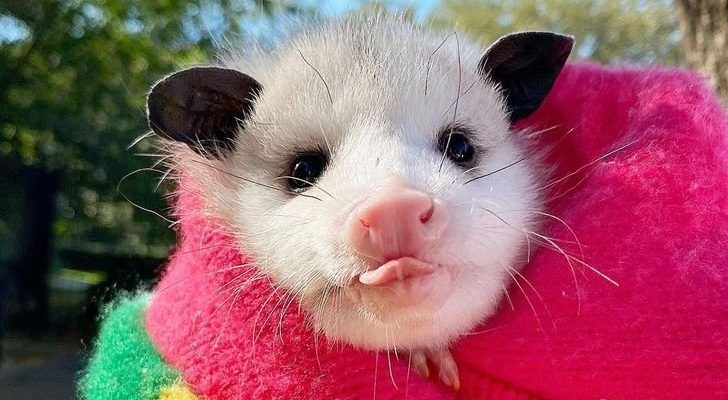
Opossums are nocturnal creatures, so seeing one during the day might seem unusual. But don’t worry! They’re generally harmless and play a crucial role in controlling pest populations. Think of them as nature’s clean-up crew. However, if you find yourself face-to-face with an opossum, knowing how to react can make all the difference. Here’s everything you need to know.
Understanding Opossums: An Overview
Opossums are often seen lurking around at night, but they can come out during the day if they’re hungry or searching for a safe place to rest. They’re typically solitary animals, preferring to keep to themselves. These marsupials are quite unique, having the ability to play dead when threatened—a strategy that can leave predators scratching their heads in confusion, just like a magician’s disappearing act!
Their diet mostly consists of insects, small rodents, and even ticks. By munching on these pests, opossums help keep the environment healthy. Speaking of health, they have a remarkable resistance to rabies, making them one of the least likely animals to spread the disease. Here’s the thing: while they may look a little scary, they’re more scared of you than you are of them!
Stay Calm: The First Step
If you spot an opossum, the most essential thing to do is to stay calm. Panic can lead to rash decisions, and that’s the last thing you want when encountering wildlife. Opossums are generally non-aggressive and will likely mind their own business.
Take a moment to observe the animal. Most of the time, they’ll simply continue on their way or try to find a place to hide. If you startle the opossum, it might freeze in place or play dead. This is completely normal behavior. Just like a kid who doesn’t want to do a chore, they’re hoping to blend into the background!
Respecting Their Space
When you encounter an opossum, it’s important to remember to respect their personal space. Animals in the wild have their routines, and getting too close can lead to stress for them—and even for you. Maintain a safe distance and avoid trying to pet or handle the opossum; they have sharp teeth and can bite if they feel threatened.
Instead, let the opossum go about its day. If it seems like it’s stuck or in danger (like hanging around a busy road), consider calling animal control for assistance. They have the expertise to handle these situations safely and can relocate the opossum if necessary.
Signs of Distress: What to Look For
While most opossums are harmless, there are signs you can watch for that indicate they may be in trouble. Here are a few common signs of distress:
- Hissing or growling: If the opossum feels threatened, it might make these sounds to scare you away.
- Staying in one spot: If the opossum doesn’t move at all, it might be injured or sick.
- Visible injuries: Look for any obvious wounds or signs of disease, such as blood or unusual behavior.
If you notice any of these signs, it’s best to keep your distance and call a wildlife rescue or local animal control to assess the situation. They’ll know how to help without putting themselves or the opossum at risk.
What to Avoid When Encountering an Opossum
There are a few actions that might seem tempting but are best avoided when you encounter an opossum in the wild. Here’s what not to do:
- Do not approach: Getting too close can scare the opossum, making it feel cornered and leading to defensive behavior.
- Avoid feeding: It’s crucial not to feed wild animals. This can encourage them to return to human areas, leading to potential conflict.
- Don’t try to catch it: Trying to handle or catch an opossum is risky for both you and the animal. Leave the handling to professionals.
It might be tempting to snap a quick photo or try to pet the cutie, but remember, they’re wild animals, and their safety (and yours!) comes first.
How Opossums Contribute to the Ecosystem
You might be wondering why it’s essential to understand opossums in the first place. These little guys play a vital role in our ecosystem. They help control pest populations, including ticks and other insects that can carry diseases, like Lyme disease. Think of them as nature’s pest control agents!
Additionally, opossums are scavengers, which means they clean up dead animals and waste. This cleanup duty is essential for maintaining a healthy environment and preventing the spread of harmful bacteria. By having opossums around, you’re essentially allowing nature to take care of its own housekeeping.
What to Do Afterwards
After your encounter with an opossum, take a moment to reflect on the experience. It might have been a bit surprising, but it’s essential to appreciate the wildlife around us. Consider sharing your experience with friends or online—it might encourage others to learn more about these fascinating creatures.
If you want to do even more, think about advocating for wildlife conservation and education in your community. The more people know about opossums and their importance, the better they’ll be treated, benefiting both nature and us.
So, the next time you come across an opossum in the wild, remember to stay calm, respect its space, and appreciate the role it plays in our ecosystem. These quirky little marsupials may not be the most glamorous animals you’ll encounter, but they’re certainly one of the most valuable. By knowing what to do, you can help protect them and ensure a peaceful coexistence. After all, we share this beautiful planet with a lot of fascinating creatures, and understanding them is part of what makes life so interesting!

